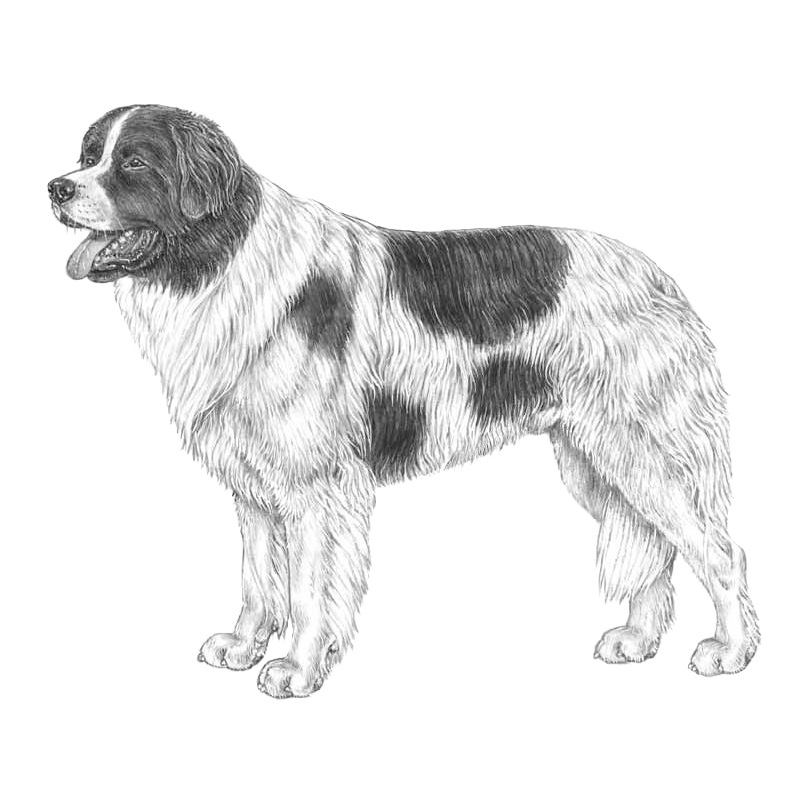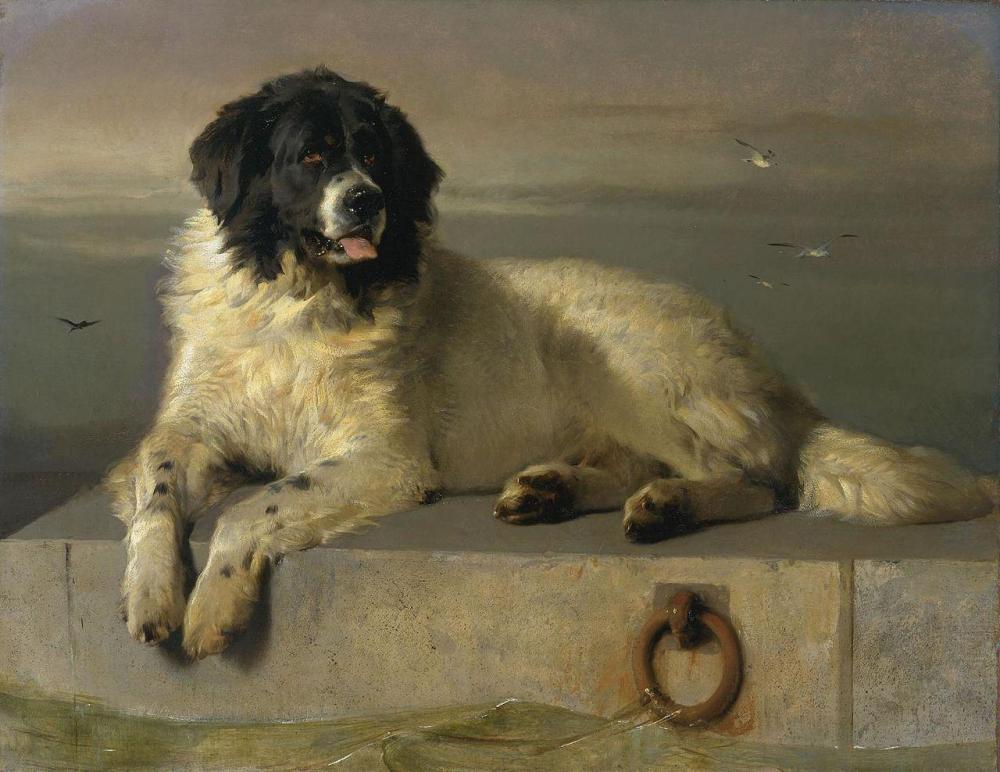NOTE: LANDSEER ECT is not the same breed of dog as the black and white 'Landseer' Newfoundland
Newfoundland - Landseer History
Newfoundland, Landseer or both? Actually, there are 3 versions: The American Newfoundland Landseer, the European Newfoundland Landseer and the European Landseer ECT.
The USA (AKC) recognizes both European and American Newfoundland Landseers but does not recognize the 3rd version, the Landseer ECT, as a version of the Newfoundland or even as a breed.
The Newfoundland Club of America addresses the question: "What is an ECT?
ECT stands for "European Continental Type". ECT's or Landseer ECT's as they are sometimes called, resemble Landseers, but are different in type and temperament. An ECT is a little taller, a little less broad, and to the person familiar with Newfs, just looks "different" than a Newf. ECT's tend to have a more "active" personality, and require an owner ready to live with a large dog which is more assertive than a typical Newf."
"As of 1998, Every country except the U.S. and Canada recognize the ECT as a separate breed from the Newfoundland."
Brief Description
The Federation Cynologique Internationale (FCI) recognized the Landseer as a distinct breed in 1960. In countries not affiliated with the FCI, such as Canada, the U.S. and the UK, the white and black Newfoundland is still referred to as a Landseer (descriptive); everywhere else, it is a white and black Newfoundland. Between 1945 and 1960 the Landseer Continental Type was bred as a part of the Newfoundland Clubs in Europe. As the dogs had many differences to the Newfoundland and the popularity of the Landseer ECT grew, the breed was recognized as a separate breed.
Source Wiki: https://en.wikipedia.org/wiki/Landseer_%28dog%29
Country of Origin and Parent Breed Club
Country of origin: Gemany / Switzerland
Parent breed club (Germany): Deutsche Landseer Club (DLC) e.V.: http://www.landseer.de/
Health and Well-Being
Some sources of health information include: National kennel clubs and breed clubs (see, e.g. Breeding/Health Strategy Documents, below) Population-level statistics (see, e.g., Swedish Insurance Data, below) Research articles Breed club surveys
Breed-Specific Articles
ARTICLE: Dogs in Canada. Saturday, June 15, 2002
By: Peter Maniate
ECT Landseer, A Separate Breed
A gentleman who recently emigrated to Canada from the Netherlands visited my kennels and then sent me an e-mail in which the following excerpt caught my eye: “…There are white/black Newfoundlands and white/black Landseer dogs. If your puppies are of original Newf bloodlines, that white/black puppy is not a Landseer, but a white/black Newfoundland…”
Naively I had thought that about five years ago when the whole issue of the European Continental Type Landseer exploded in the U.S. and to a lesser extent, here in Canada, the matter was settled once and for all. However I forgot that the global village applies to dogs as well as everything else.
This new breed, usually referred to as the ECT Landseer, according to one version, got started in 1918, with the cross breeding of a Kuvasz and a white & black Newfoundland. However, The International Encyclopedia of Dogs by Anne Rogers Clark & Andrew H. Brace, Howell, 1995 claims: “The Landseer was developed in Germany and Switzerland. During the 1930’s, breeders in these countries started a breeding program by crossing black-and-white Newfoundlands with Pyrenean Mountain Dogs.”
 Whatever the actual origin, the goal apparently was to produce or retain the white and black dog that Sir Edwin Landseer had painted in England in the first part of the 19th century. It was most unfortunate that the name chosen for this new breed was the traditional name given to white and black Newfs. However the international governing body for dogs, the Federation Cynologique Internationale (FCI) recognized the new breed in 1960 with the name Landseer.
Whatever the actual origin, the goal apparently was to produce or retain the white and black dog that Sir Edwin Landseer had painted in England in the first part of the 19th century. It was most unfortunate that the name chosen for this new breed was the traditional name given to white and black Newfs. However the international governing body for dogs, the Federation Cynologique Internationale (FCI) recognized the new breed in 1960 with the name Landseer.
Now, in countries not affiliated with the FCI, such as Canada, the U.S. and the UK, the white and black Newf is still referred to as a Landseer; everywhere else, it is a white and black Newfoundland.
There are many claims that ECT Landseers have been registered as Newfs in the U.S. and possibly in Canada and some even go so far as to claim that most Newfs today are related to the founding cross-breedings of the ECT Landseer. The probability is that at least some of the genes snuck in to our Newfoundland breeding programs, but certainly not enough to adversely affect our breed.
To close the door on any further incursions, the Newfoundland Club of America alerted the American Kennel Club and the Newfoundland Dog Club of Canada advised the Canadian Kennel Club. Assurances were received from both national registering bodies. However, until there is unanimous international agreement, confusion is bound to remain.
Peter Maniate
Newf News January/February 2015
Breed Standards
There is one breed standard - FCI. The basis of breed/conformation shows is the judging of pedigree dogs against the 'Breed Standard', which is a picture in words that describes the range of features that are deemed appropriate for the breed.
FCI (Federation Cynologique Internationale)
Breed-Specific Statistics
1. Sweden: The RAS Rasspecifik avelsstrategi för Landseer contains statistical information for the Landseer ECT.
Partial Data - Breed Registrations shown in the RAS
|
2009
|
2008
|
2007
|
2006
|
2005
|
2004
|
|
93
|
104
|
61
|
98
|
52
|
96
|
2. Finland: Database: http://jalostus.kennelliitto.fi/frmEtusivu.aspx?R=226
3. Germany (VDH): Breed Registrations
|
2013
|
2012
|
2011
|
|
338
|
277
|
285
|
Breeding/Health Strategy Documents
Health/Breeding Strategy Documents and Links
Sweden: Breed Specific breeding strategy for Landseer (Landseer Europäisch kontinentaler-Type)
Finland: JTO: https://jalostus.kennelliitto.fi/RotuPDF.ashx?R=226&T=2
Breed-Specific DNA Tests:
Breed Clubs
We are listing sites for breed clubs with health or other information that might be helpful. Follow links below.
Finland: Suomen Landseeryhdistys ry: https://www.suomenlandseeryhdistys.fi/
Sweden: Svenska Landseerklubben: https://www.svlk.se/
France: CLUB FRANÇAIS DU CHIEN TERRE NEUVE ET DU LANDSEER (CFCTNL)
Germany: Deutsche Landseer Club (DLC) e.V.
EULECT strives for better communication between the connected European Landseer Club with the main objective to get through exchange of information to improve the health of our race. (limited information available on the website)
 Donate
Donate


Recommended Comments
There are no comments to display.
Join the conversation
You can post now and register later. If you have an account, sign in now to post with your account.
Note: Your post will require moderator approval before it will be visible.